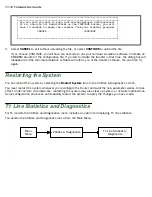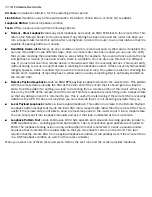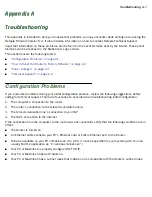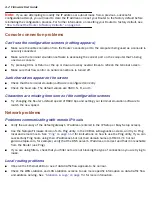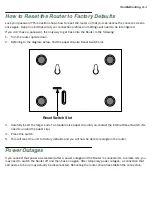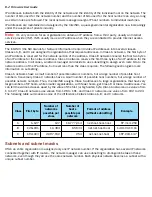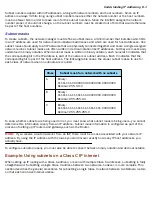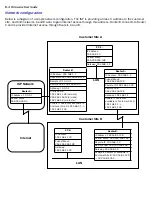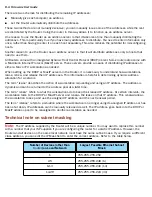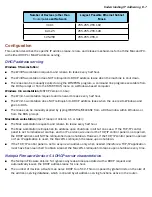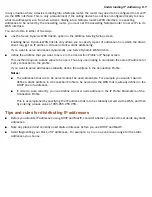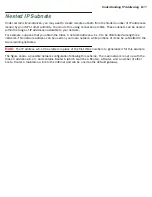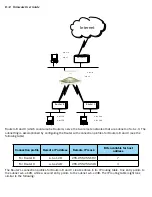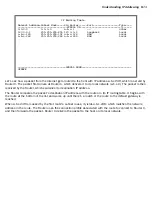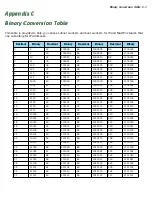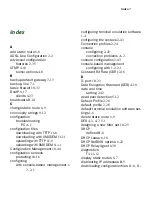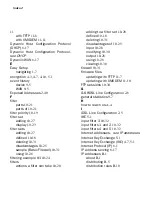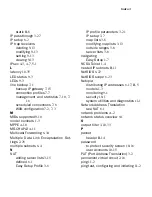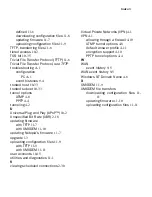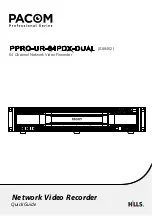
B-8 Firmware User Guide
■
The Router releases the DHCP address back to the available DHCP address pool exactly one hour after the
last-heard lease request. Some other DHCP implementations may hold on to the lease for an additional
time after the lease expired to act as a buffer for variances in clocks between the client and ser ver.
MacIP serving
Macintosh workstation
(MacTCP or Open Transpor t):
Once the Mac workstation requests and receives a valid address, the Router actively checks for the
workstation’s existence once ever y minute.
■
For a dynamic address, the Router releases the address back to the address pool after it has lost contact
with the Mac workstation for over 2 minutes.
■
For a static address, the Router releases the address back to the address pool after it has lost contact
with the Mac workstation for over 20 minutes.
Netopia Firmware Version 5.4 MacIP server characteristics
The Mac workstation uses ATP to both request and receive an address from the Router's MacIP ser ver. Once
acquired, NBP confirm packets will be sent out ever y minute from the Router to the Mac workstation.
Manually distributing IP addresses
If you choose to manually distribute IP addresses, you must enter each computer’s address into its TCP/IP
stack software. Once you manually issue an address to a computer, it possesses that address until you
manually remove it. That’s why manually distributed addresses are called static addresses.
Static addresses are useful in cases when you want to make sure that a host on your network cannot have its
address taken away by the address ser ver. Appropriate candidates for a static address include a network
administrator’s computer, a computer dedicated to communicating with the Internet, and routers.
Using address serving
The Router provides three ways to ser ve IP addresses to computers on a network. The first, Dynamic Host
Configuration Protocol (DHCP), is suppor ted by PCs with Microsoft Windows and a TCP/IP stack. Macintosh
computers using Open Transpor t and computers using the UNIX operating system may also be able to use
DHCP. The second way, MacIP, is for Macintosh computers. The third way, called Ser ve Dynamic WAN Clients
(IPCP), is used to fulfill WAN client requirements
The Router can use both DHCP and MacIP. Whether you use one or both depends on your par ticular networking
environment. If that environment includes both PCs and Macintosh computers that do not use Open Transpor t,
you need to use both DHCP and MacIP to distribute IP addresses to all of your computers.
Serve dynamic WAN clients
The third method, used to fulfill WAN client requirements, is called Ser ve Dynamic WAN Clients. The correct
term or protocol is a subset of the PPP suite call IPCP. Originally, this would apply only to switched WAN
inter face routers, and not to leased line routers. However, a new feature can give you Asynchronous PPP dial-in
suppor t on the Auxiliar y por t on any router including leased line Netopia routers.
Содержание 4000 Series
Страница 10: ...x Firmware User Guide Packet header types B 14 Appendix C Binary Conversion Table C 1 Index ...
Страница 18: ...1 8 Firmware User Guide ...
Страница 66: ...2 48 Firmware User Guide ...
Страница 102: ...3 36 Firmware User Guide ...
Страница 130: ...4 28 Firmware User Guide ...
Страница 206: ...7 18 Firmware User Guide ...
Страница 224: ...9 14 Firmware User Guide ...
Страница 274: ...10 50 Firmware User Guide ...
Страница 314: ...Index 6 ...

